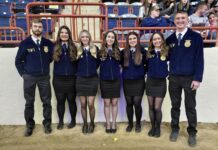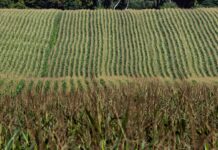As most readers have probably guessed, I have a large collection of old farm literature that has been gathered from various sources over the last twenty-five years or so.
The following humorous poems were found in a couple of these publications.
In the July 27, 1893, issue of The Farm Implement News was the following unaccredited plaint that gives a glimpse of what the “Good Old Days” were like for some farm boys.
WOULD I WERE A BOY AGAIN
I’d like to be a boy again, without a woe or care, with freckles scattered on my face, and hayseed in my hair.
I’d like to rise at 4 o’clock and do a hundred chores, like saw the wood and feed the hogs and lock the stable doors.
And herd the hens and watch the bees and take the mules to drink, and teach the turkeys how to swim so that they would not sink.
And milk about a hundred cows and bring in wood to burn, and stand out in the sun all day and churn and churn and churn.
And wear my brother’s cast-off clothes and walk four miles to school, and get a licking every day for breaking some old rule, and then go home again at night and do the chores once more, and milk the cows and slop the hogs and feed the mules galore.
And then crawl wearily up the stairs to seek my little bed, and hear Dad say, “That worthless boy! He doesn’t earn his bread!” I
‘d like to be a boy again, a boy has so much fun, his life is just one round of mirth, from rise to set of sun.
I guess there’s nothing pleasanter than closing stable doors, and herding hens and chasing bees and doing evening chores.
From The Pennsylvania Farmer of November 21, 1925, was this gem:
THE CHEERFUL PLOWMAN
J. Edw. Tufft
Neglecting minor choring around a fellow’s farm brings tragedies deploring and does a heap of harm!
It doesn’t do, by Harry, to say, “another day,” or “later,” “let it tarry,” “I’ll lay this job away.”
I once neglected fixing, a neck yoke that was weak, and soon my team was mixing with fishes in the creek.
I once said, “These old traces on this old harness here are weakening in places and need some care, I fear, but I’ll get busy later and rivet on a strap, right now I mustn’t cater to this decrepid trap.”
But, bingo, I was driving a wagon on a hill, my team was nobly striving with most determined will, when suddenly dividing, the traces gave a snap, and backwards I was sliding and praying for a strap!
My buggy in its gearing, one summer long ago, took on a case of veering and swaying to and fro, but I said,
“This has lasted for thirty years and more, its fasteners were blasted from Pennsylvania’s ore, so one more week, I reckon, won’t make or mar the rig, although its braces beckon for splices strong and big!”
Well, on the road to Hease’s, the day those words were said, that buggy went to pieces and I was put to bed!
I learned those lessons early, and sadly if you please, and retribution, burly, took me across his knees, so I made solemn pledges to watch the little chores, the buckles, and the wedges, the stitches and the bores, the bolts, the pins, the castings, the rivets and the nails, the braces and the mastings, the splices and the rails; I took an oath tremendous to stand off no repairs until a break stupendous brought tragedies and cares.
I fix each little crevice the day the break appears; no broken tug or clevis has brought me grief for years!
Then, although not in verse, is a fishy story from the March, 1939 Farm Journal magazine:
“Gilbert McHenry of Spencer, Indiana, claims that a catfish put in the farm pond 54 years ago by his father has grown so large that it’s a menace to the stock. McHenry said, ‘That fish weighs 100 pounds. Why, just the other day he whisked out to the edge of the pond and pulled a young pig under the water and we never saw the pig again. The fish has got to go!'”
Another blurb in the same magazine told of a farmer, name of Burt Washburn, who went into the IH dealer in Susquehanna, Pennsylvania and ordered a new plow–with a radio attached! Washburn explained; “It’s essential, if I’m going to sow, cultivate and reap the way the USDA requires, then I’ve got to check up every day to find out what the rules are. Radio seems to be the only way to do it.”
And in the March, 1939, “Now Is the Time To:” column was this advice to farmers; Test seed corn. Make a hotbed. Plant sweet peas. Roll winter wheat. Top-dress pastures. Rent a cold storage locker. Build creep for early lambs. Order garden and flower seeds. Transplant large trees and shrubs.
Ask Mother what color she wants the house painted. Prune the orchard, clean up and burn the trimmings. Buy some corner fasteners and make screens for windows.
Clean, scrub, disinfect brooder and farrowing houses.
There’s some great reading in the old farm magazines and papers.













